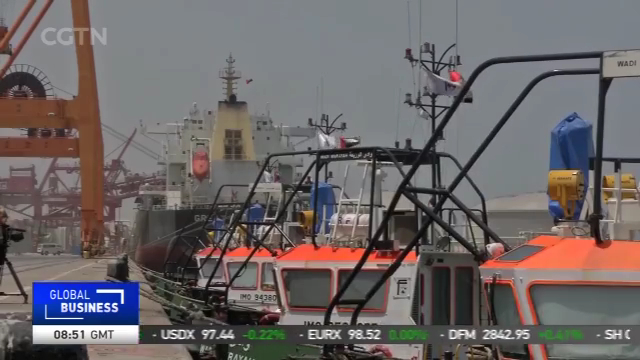
17:23, 08-Aug-2019
Tanker Tensions: Impact on Gulf Oil
Updated
17:44, 08-Aug-2019

It's approaching three months since the first tanker attack rocked trade in the Gulf's crucial oil transit route. And tensions show little sign of letting up. Iran still holds a British flagged ship and US sanctions continue to restrict the flow of Iranian crude. Our reporter Jacob Greaves has been looking at the impact so far.
The UK has now pledged to join America in policing the Strait of Hormuz. It comes as waters in the Gulf have become synonymous with scenes like this. Two separate attacks on tankers in the region in recent months. The US claims Tehran is involved - Iran still denies responsibility, but whoever's to blame, companies looking to use the crucial oil transit route are faced with increasing risk.
RANJITH RAJA, SENIOR ANALYST REFINITIV "Insurance premiums have definitely been the huge factor impacting the maritime sector as of now because of the various incidents and following the June incident when the two tankers were attacked in the Gulf of Oman the premiums shot up by over 10% overnight and after the recent events involving the Stena, where the maritime security has been enhanced and the perceived threat has enhanced the quotes for say VLCC coming into the region has been in the range of about $100,000 for a seven day transit in the Gulf."
But in waterways linking Middle East oil producers with international buyers, there's more at stake.
JACOB GREAVES DUBAI "As an oil exporter the UAE is among those Gulf nations exposed to any disruptions to freedom of navigation in the region, but it could be impacted in other ways, in Fujairah it has of the world's largest bunkering hubs, heightened, protracted tensions risk shippers turning to other refuelling ports."
Providing ship fuel for passing tankers is big business for Fujairah. But It was just off its coast that back in May that this happened. The first incident in the region, involving four tankers.
Analysts point to a resulting dent in business.
MATT STANLEY, SENIOR BROKER STAR FUELS "The biggest impact has been on demand for bunkers down in Fujairah, it has seen, it saw a sizeable drop off immediately after the attacks and picked up a little bit since then it's probably down to the fact that geographically Fujairah's the best placed bunkering hub in the region which is why it was so popular there with owners, but also the prices have discounted quite heavily just to attract some more business in."
Those fuel discounts on offer have been sizeable. Refinitiv data suggests at times - as much as $45 per metric tonne cheaper than in rival Singapore.
MATT STANLEY, SENIOR BROKER STAR FUELS "Unless there is some reassurance that the Fujairah government or whoever the powers may be to steady things down in Fujairah at the moment then I think over the course of time owners will reposition, they won't regard Fujairah as a bunkering hub as secure as it used to be and it will have an adverse effect on the region in general."
Iran has threatened to close the Strait of Hormuz if it can't trade oil in line with a nuclear pact reached in 2015. This week the US and Saudi Arabian energy ministers expressed their concern at any threat to freedom of navigation. Images like this could cast a shadow over oil markets for some time. JG, CGTN, Dubai.
SITEMAP
Copyright © 2018 CGTN. Beijing ICP prepared NO.16065310-3
Copyright © 2018 CGTN. Beijing ICP prepared NO.16065310-3